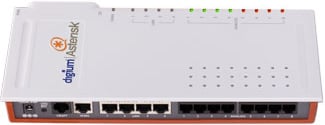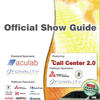







Some cards work more seamlessly and have better driver support than others. For instance, I've heard it is difficult to get Dialogic channel drivers to work on Asterisk. I recall hearing that the Dialogic driver was licensed such that it could only be used with Asterisk Business Edition. In any event, with so much hardware competition for the Asterisk platform, how does this affect Digium, the corporation behind the open source Asterisk movement? A lot of their revenue comes from their hardware business, so with so many choices will this leave Digium "high and dry"?
Case in point, Fonality was Digium's largest customer, buying more Digium cards than anyone else. However, Fonality made the decision to go with Sangoma hardware over Digium because Sangoma hardware was less expensive and until recently, only Sangoma hardware supported the Octasic echo-cancellation for superior VoIP sound quality. I recall Fonality's CEO Chris Lyman a year or two ago mentioning they went with Sangoma hardware because they were sick and tired of all the support issues with Digium hardware. The trixbox appliance, another Fonality product, by default comes with Sangoma hardware, though you can get it pre-installed with Digium cards. There are also many horror stories of Asterisk users trying to get Digium hardware to install properly due to hardware interrupt issues. I compared/contrasted Digium hardware vs. Sangoma hardware last year. It's a bit out of date now since Digium now supports Octasic echo cancellation. Nevertheless, it's worth a look.
As SmithonVoIP points out, Sangoma's stock has been going like gangbusters when he points out, "Sangoma posted their Q3 earnings today, which showed a 24% increase in revenues over the previous quarter of this year, a 68% year over year increase in sales revenues, a 69% year over year increase in net income, and a 56% year over year increase in Net earnings." Relatedly, Rich Tehrani and I were discussing Sangoma's phenomenal stock growth a few weeks ago and both of us planned on writing about it. I believe Rich has an article planned for Internet Telephony Magazine highlighting Sangoma. Obviously, Sangoma has been riding the "hockey stick curve" of Asterisk, which has been dramatically boosting Sangoma's revenue. (they sell other hardware as well)
Then you have OpenVox, a company based in China offering "Digium-cloned" hardware. They use the same hardware reference design that Digium uses. In fact, they look nearly identical. While they also suffer from the same hardware interrupt issues as Digium hardware, they're 20% cheaper - or more. OpenVox was probably the first Digium clone and I believe is the largest. Similarly, another Chinese-based company, ZAPMICRO is also offering Digium-cloned hardware. Then you have cyLogistics, a great online VoIP store, offering OpenVox hardware, as well as Sangoma, Aculab, PIKA, and Digium. I heard through the open source grapevine that Digium is refusing to allow any distributors to carry Digium hardware if they sell OpenVox cloned hardware. But apparently cyLogistics either has a "pass" from Digium or they're skirting the "ban" by purchasing Digum hardware through other resellers. I've heard from my other sources as well that they aren't happy that Digium is forcing distributors to carry Digium Asterisk hardware exclusively.
 I say all this to ponder Digium's future. Will the open source Asterisk community have "brand loyalty" to Digium, since Mark Spencer founded the whole Asterisk movement? Or will the open source community, which is notoriously "fickle" when it comes to price choose the least expensive hardware that just plain works? T1/E1 and analog cards that work on Asterisk are becoming commoditized, so if Digium doesn't sell their telephony cards, where does that leave them? They can make revenue on the Asterisk Appliance once it ships, but their core revenue right now is from their telephony cards.
I say all this to ponder Digium's future. Will the open source Asterisk community have "brand loyalty" to Digium, since Mark Spencer founded the whole Asterisk movement? Or will the open source community, which is notoriously "fickle" when it comes to price choose the least expensive hardware that just plain works? T1/E1 and analog cards that work on Asterisk are becoming commoditized, so if Digium doesn't sell their telephony cards, where does that leave them? They can make revenue on the Asterisk Appliance once it ships, but their core revenue right now is from their telephony cards.Let me say that I personally like Digium and especially Mark Spencer. I'm met Mark a few times and he even took me out for "linner" (lunch/dinner) at TMC's Internet Telephony Conference & Expo. I want Digium to succeed because it will only help further grow the Asterisk community. Even though a healthy ecosystem of third-party Asterisk-based PBXs now exists and there is still a strong open source community helping to drive the open source Asterisk code, Digium is still Asterisk's champion.
 Losing Digium to under-priced Chinese cloned hardware or even to tough competition from Rhino or Sangoma would be a tough pill for me to swallow.
Losing Digium to under-priced Chinese cloned hardware or even to tough competition from Rhino or Sangoma would be a tough pill for me to swallow.If you were to ask me which hardware I would use in an Asterisk solution, well if I think with my "open source loving heart", my choice would be Digium. However if I think with my technical CTO brain, my recommendation would have to be to install Sangoma hardware. It has some key advantages over Digium & Digium cloned hardware, including lower cost, better scalability, and better interrupt handling for a trouble-free Asterisk installation. In fact, you can install a single PCI or PCIx card and then attach daughter cards to it that don’t use a PCI slot and share the same interrupt. And so I ask you open source community and Asterisk-based dealers/resellers/end-users, etc., what are your thoughts on Digium's future? The comment lines are open.











